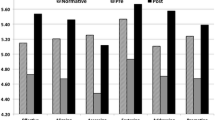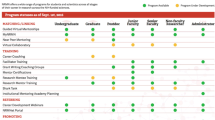Abstract
Mentoring is increasingly recognized as a critical element in supporting successful careers in academic research in medicine and related disciplines, particularly for trainees and early career investigators from underrepresented backgrounds. Mentoring is often executed ad hoc; there are limited programs to train faculty to become more effective mentors, and the few that exist have a dearth of empirical support of their impact. In 2013, we recruited 34 faculty from across the US engaged in HIV-related clinical research to participate in a 2-day Mentoring the Mentors workshop. The workshop included didactic and interactive content focused on a range of topics, such as mentor–mentee communication, leadership styles, emotional intelligence, understanding the impact of diversity (unconscious bias, microaggressions, discrimination, tokenism) for mentees, and specific tools and techniques for effective mentoring. Pre- and post-workshop online evaluations documented high rates of satisfaction with the program and statistically significant improvements in self-appraised mentoring skills (e.g. addressing diversity in mentoring, communication with mentees, aligning mentor–mentee expectations), as assessed via a validated mentoring competency tool. This is the first mentoring training program focused on enhancing mentors’ abilities to nurture investigators of diversity, filling an important gap, and evaluation results offer support for its effectiveness. Results suggest a need for refinement and expansion of the program and for more comprehensive, long-term evaluation of distal mentoring outcomes for those who participate in the program.

Similar content being viewed by others
References
Bandura, A. (1986). Social foundations of thought and action: A social cognitive theory. Englewood Cliffs, NJ: Prentice-Hall Inc.
Eby, L. T., Allen, T. D., Evans, S. C., Ng, T., & Dubois, D. (2008). Does mentoring matter? A multidisciplinary meta-analysis comparing mentored and non-mentored individuals. Journal of Vocational Behavior, 72(2), 254–267.
Fleming, M., House, S., Hanson, V. S., Yu, L., Garbutt, J., McGee, R., et al. (2013). The mentoring competency assessment: Validation of a new instrument to evaluate skills of research mentors. Academic Medicine, 88(7), 1002–1008.
Gandhi, M., Fernandez, A., Stoff, D. M., Narahari, S., Blank, M., Fuchs, J., et al. (2014). Development and implementation of a workshop to enhance the effectiveness of mentors working with diverse mentees in HIV research. AIDS Research and Human Retroviruses, 30(8), 730–737.
Ginther, D. K., Schaffer, W. T., Schnell, J., Masimore, B., Liu, F., Haak, L. L., et al. (2011). Race, ethnicity, and NIH research awards. Science, 333(6045), 1015–1019.
Huskins, W. C., Silet, K., Weber-Main, A. M., Begg, M. D., Fowler, V. G, Jr, Hamilton, J., et al. (2011). Identifying and aligning expectations in a mentoring relationship. Clinical and Translational Science, 4(6), 439–447.
Johnson, M. O., Subak, L., Brown, J., Lee, K., & Feldman, M. (2010). An innovative program to train health sciences researchers to be effective clinical and translational-research mentors. Academic Medicine, 85(3), 484–489.
Koenig, R. (2009). U.S. higher education. Minority retention rates in science are sore spot for most universities. Science, 324(5933), 1386–1387.
Lent, R. W., Brown, S. D., & Hackett, G. (1994). Toward a unifying social cognitive Theory of career and academic interest, choice, and performance. Journal of Vocational Behavior, 45, 79–122.
Pfund, C., House, S., Spencer, K., Asquith, P., Carney, P., Masters, K. S., et al. (2013). A research mentor training curriculum for clinical and translational researchers. Clinical and Translational Science, 6(1), 26–33.
Pfund, C., Maidl Pribbenow, C., Branchaw, J., Miller Lauffer, S., & Handelsman, J. (2006). Professional skills. The merits of training mentors. Science, 311(5760), 473–474.
Stamm, M., & Buddeberg-Fischer, B. (2011). The impact of mentoring during postgraduate training on doctors’ career success. Medical Education, 45(5), 488–496.
Straus, S. E., Johnson, M. O., Marquez, C., & Feldman, M. D. (2013). Characteristics of successful and failed mentoring relationships: A qualitative study across two academic health centers. Academic Medicine, 88(1), 82–89.
Acknowledgments
The authors wish to thank the investigators who participated in the workshop described in this paper and our colleagues who helped develop or facilitate the curriculum. This paper was supported by the following Grants from the National Institutes of Health: R24MH094274 (Gandhi, P.I.), K24MH087220 (Johnson, P.I.), and K24DA037034 (Johnson, P.I.).
Author information
Authors and Affiliations
Corresponding author
Rights and permissions
About this article
Cite this article
Johnson, M.O., Gandhi, M. A mentor training program improves mentoring competency for researchers working with early-career investigators from underrepresented backgrounds. Adv in Health Sci Educ 20, 683–689 (2015). https://doi.org/10.1007/s10459-014-9555-z
Received:
Accepted:
Published:
Issue Date:
DOI: https://doi.org/10.1007/s10459-014-9555-z




